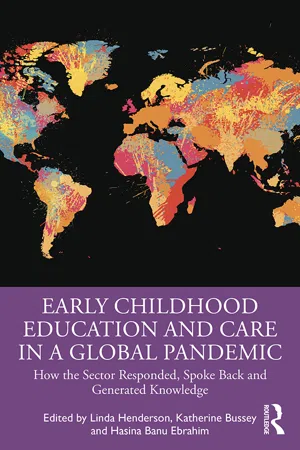
Early Childhood Education and Care in a Global Pandemic
How the Sector Responded, Spoke Back and Generated Knowledge
- 230 pages
- English
- ePUB (mobile friendly)
- Available on iOS & Android
Early Childhood Education and Care in a Global Pandemic
How the Sector Responded, Spoke Back and Generated Knowledge
About This Book
Early Childhood Education and Care in a Global Pandemic is a book that highlights how the international early childhood education and care sector responded to the global COVID-19 pandemic. It shows the resiliency of the sector around the world as it grappled with a rapidly changing environment of uncertainty and complexity.
Drawing on a diverse range of early childhood education and care contexts, the book captures real-life examples of how COVID-19 impacted children, educators and teachers, and families. Chapters present cases of the particular challenges that COVID-19 presented in a wide range of countries and then how they responded to these challenges – challenges that tested the resilience of children, educators and teachers, and families. By forward anchoring, each chapter examines the opportunities that arose from these challenges and how new local knowledge was produced as new ways were found to support children, educators and teachers, and families during this time.
This book offers early childhood education and care a timely resource on lessons learnt from a once-in-a-lifetime event. It offers the sector a way forward to commit to developing new ways of thinking and working that stem from the lessons learnt during the COVID-19 pandemic.
Frequently asked questions
Information
1
Preschool children’s ideas about the COVID-19 pandemic
Introduction
The Swedish context
- Whenever possible, work from home.
- Maintain physical distance from other people (1.5–2 metres).
- Stay at home if you are ill or feel unwell with cold symptoms, cough, or fever stating, “You should stay at home for at least seven days after falling ill including two days with no fever”.
- You should get tested if your symptoms do not pass within 24 hours.
- Maintain good hand hygiene. Wash your hands with soap and water for at least 20 seconds. If handwashing facilities are not available, alcohol-based hand rub is an alternative.
- Avoid touching your face (eyes, nose, mouth).
- Cough and sneeze into your elbow.
- Avoid social gatherings, maximum allowed 50 people, from December eight people.
- Maintain physical distance from other people at sports grounds.
Table of contents
- Cover
- Endorsements
- Half Title
- Title Page
- Copyright Page
- Table of Contents
- List of illustrations
- List of contributors
- Foreword
- 1. Preschool children’s ideas about the COVID-19 pandemic
- 2. Dora’s doll got sick: Preschool children’s wellbeing and play during the COVID-19 crisis
- 3. Back to day one: The impact of COVID-19 lockdowns on the return to kindergarten in Australia
- 4. Children’s transition between home and ECEC services: Innovative practices during the COVID-19 pandemic
- 5. Children’s participation in education during COVID-19
- 6. COVID-19 pandemic and centre-based services for children under three: Evidence and insights from the Portuguese context
- 7. Predictors for caregiver involvement in childcare, education, and early learning in Kenyan urban informal settlements during COVID-19
- 8. Drop-off at the gate: Challenges to parent–staff collaboration in Danish childcare in the era of COVID-19
- 9. Education and care: Expanding traditional pedagogies with(in) a pandemic
- 10. What does it mean to educate and care for children in Brazil in times of COVID-19?
- 11. Struggles at the frontline in pandemic times: Time to reimagine early childhood care and education in South Africa
- 12. Distance learning in Cameroon: Case study of private nursery school teachers’ experiences and challenges amidst the COVID-19 lockdown
- 13. Politics and practices of the new normal: What are preschool teachers’ experiences during the COVID-19 pandemic in Turkey?
- 14. The role of the Australian Education Union Victoria in supporting early childhood educators during a global pandemic: Tensions, challenges and opportunities for the profession
- 15. A ‘quint-essential(ised)’ ECE workforce: COVID-19 and the exploitation of labour
- Afterword
- Index